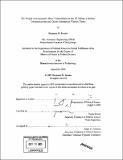The weight of an assassin's mace : vulnerabilities in the US military's satellite communications and China's information warfare threat
Author(s)
Brooks, Benjamin M
DownloadFull printable version (5.253Mb)
Other Contributors
Massachusetts Institute of Technology. Dept. of Political Science.
Advisor
Taylor Fravel.
Terms of use
Metadata
Show full item recordAbstract
Believing that an information Revolution of Military Affairs has occurred, the US military is currently transforming to achieve dominance over the full spectrum of deployment scenarios with a lighter, more mobile, and more capable force. Establishing a far-reaching, robust, ubiquitous ISR and telecommunications network, and a network-centered fighting doctrine are keys to this endeavor. Of the many systems needed, satellite communications are especially significant because they are the prime method of transmitting high quantities of information to remote and mobile units. The People's Republic of China too has become aware of the information Revolution of Military Affairs, as well as the vulnerabilities associated with it. Though the People's Republic is still in the process of modernizing its society and military, the doctrines and advantages of Information Warfare have not been lost to it. It seeks to equip itself with the IT and skill sets that are becoming increasingly more available to asymmetrically affect the information usage of a technologically superior adversary. As it stands, the military's use of satellite communications is vulnerable. (cont.) Though some satellite communications have inherent protective qualities, they are still susceptible to some variants of Electronic Attack and anti-satellite attack. Military-dedicated systems do not offer enough security, and the lack of bandwidth they provide forces the military to use much less secure commercial systems. It appears that the People's Republic presents only a moderate threat to the military's satellite communications. This will not always be the case. The rapid growth of People's Republic and its increasing informationalization, as well as the expanding US military demand for wideband systems and predictions of a continuing shortfall, all place the military's satellite communications in a precarious situation.
Description
Thesis (S.M.)--Massachusetts Institute of Technology, Dept. of Political Science, 2005. Includes bibliographical references.
Date issued
2005Department
Massachusetts Institute of Technology. Department of Political SciencePublisher
Massachusetts Institute of Technology
Keywords
Political Science.